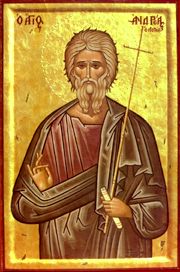Difference between revisions of "Apostle Andrew"
m (→External links: Removing dead link (Come and See Icons)) |
m |
||
| Line 1: | Line 1: | ||
[[Image:Andrew the First-Called.jpg|right|frame|Apostle Andrew the First-Called]] | [[Image:Andrew the First-Called.jpg|right|frame|Apostle Andrew the First-Called]] | ||
| − | The holy, glorious and all-laudable '''Apostle Andrew the First-Called''' was the first of the [[apostles]] of [[Jesus Christ]] and the brother of the [[Apostle Peter]]. | + | The holy, glorious and all-laudable '''Apostle Andrew the First-Called''' was the first of the [[apostles]] of [[Jesus Christ]] and the brother of the [[Apostle Peter]]. His great [[missionary]] legacy led him to become the [[patron saint]] of several countries, including Romania and Scotland. His [[feast day]] is [[November 30]]. |
==Life== | ==Life== | ||
| Line 33: | Line 33: | ||
== Source == | == Source == | ||
*St. [[Nikolai Velimirovic]], ''The [[Prologue of Ohrid]]'' | *St. [[Nikolai Velimirovic]], ''The [[Prologue of Ohrid]]'' | ||
| + | |||
| + | ==See also== | ||
| + | *[[Missionary]] | ||
==External links== | ==External links== | ||
Revision as of 13:20, June 17, 2020
The holy, glorious and all-laudable Apostle Andrew the First-Called was the first of the apostles of Jesus Christ and the brother of the Apostle Peter. His great missionary legacy led him to become the patron saint of several countries, including Romania and Scotland. His feast day is November 30.
Contents
Life
Andrew was a fisherman by trade, born in Bethsaida. A disciple of John the Forerunner, he left St. John to follow Jesus Christ following his baptism and brought along his brother, the Apostle Peter. Both are numbered among the Twelve Great Apostles. After Pentecost, the lot fell to St. Andrew to preach in:
- Byzantium: he appointed St. Stachys as its first bishop
- Thrace, Peloponnese, Greece, and Epirus: he converted many to the Faith and ordained bishops and priests for them
- Georgia: he entered Georgia from Ajara, preached Christianity in Atsquri, built small church there and left miracle-working icon of Theotokos.
- Rus' lands: in Kiev he planted a cross on one of the high hills of Kiev, and he prophesied a city that would have many golden-domed churches, and a bright Christian future for the Rus' people.
St. Andrew was martyred in Peloponnese, in the city of Patras. The Proconsul Aegeates' family believed in the miracles and preaching of St. Andrew, and the enraged Proconsul tortured and crucified St. Andrew. The new converts wanted to remove him from his cross, but the saint would not allow them. Instead, he comforted them from the cross and as he prayed an extraordinary light encompassed him for about a half hour. When it left, he gave up his soul. It was the year 62 AD.
St. Andrew's relics were taken to Constantinople, his head to Rome and a hand to Moscow.
Hymns
Troparion (Tone 4)
- Andrew, first-called of the Apostles
- and brother of the foremost disciple,
- entreat the Master of all
- to grant peace to the world
- and to our souls great mercy.
Kontakion (Tone 2)
- Let us praise Andrew, the herald of God,
- the namesake of courage,
- the first-called of the Savior's disciples
- and the brother of Peter.
- As he once called to his brother, he now cries out to us:
- "Come, for we have found the One whom the world desires!"
Source
- St. Nikolai Velimirovic, The Prologue of Ohrid
See also
External links
Categories > Church History
Categories > Church History
Categories > Church History
Categories > Church History
Categories > Liturgics > Feasts
Categories > Liturgics > Feasts
Categories > Liturgics > Feasts
Categories > Liturgics > Feasts
Categories > People > Saints
Categories > People > Saints > Biblical Saints
Categories > People > Saints > Martyrs
Categories > People > Saints > Saints by century > 1st-century saints
